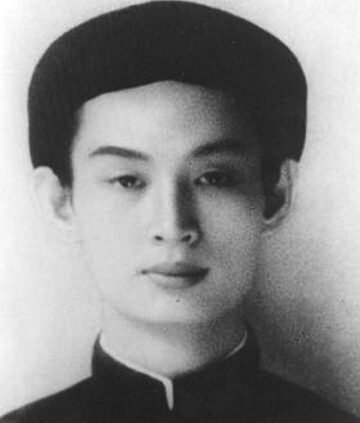LỜI KHUYÊN BỔN ĐẠO
Advice to my fellow believers
Minh Sư
Hoà Hảo
Hòa Hảo is a Vietnamese new religious movement.[1] It is described either as a syncretistic folk religion or as a sect of Buddhism. It was founded in Cochinchina in 1939 by Huỳnh Phú Sổ (1920–47), who is regarded as a saint by its devotees.[2] It is one of the major religions of Vietnam with between one million and eight million adherents, mostly in the Mekong Delta.
Site Search
Site Search
Minh Vương
MINH VƯƠNG Một vị vua trí tuệ (tiếng Phạn: विद्याराज; IAST: vidyārāja, tiếng Trung: 明王; bính âm: Míngwáng; Phát âm tiếng Nhật: Myōō) là một loại vị thần phẫn nộ trong Phật giáo Đông Á. Trong khi tên tiếng Phạn được dịch theo nghĩa đen là “(các) vua trí tuệ / tri thức”, thuật ngữ […]
TiêuSuDucThay-Englo-Vietnamese
Tiểu Sử của Đức Huỳnh Giáo Chủ Người sáng lập Đạo Phật-Giáo Hòa-Hảo là Đức Thầy Huỳnh- Phú-Sổ. Sanh ngày 25 tháng 11 năm Kỷ-Mùi (1919) tại làng Hòa- Hảo, tỉnh Châu-Đốc, một tỉnh xa xôi giáp biên-thùy Việt-Miên thuộc miền nam Việt-Nam. Ngài là trưởng nam của Đức Ông Huỳnh-Công-Bộ và Đức Bà Lê-Thị-Nhậm; […]
Master Bio Sino-Freanch
先知 黃福素 的簡短傳記 Phật Giáo Hòa Hảo, 翻譯為‘和好佛教’, 的創始人是非常受人尊敬的 Huỳnh Phú Sổ, 翻譯爲黄富數 .他於地羊年(1920 年 1 月 15 日)11 月 25 日出生在越南南部 An Giang 州,Chau Doc 的 Hoa Hao 村,該省毗鄰越南-柬埔寨邊境。他是 Huynh Cong Bo 和 Le Thi Nham 的長子,是當地社區最著名的家族之一,对于他們的慷慨和信譽。在童年時期,他完成了小學教育,可是因此身體虛弱,離開學校去療養。 從15歲到 19歲,無論他的主治醫生有多好,他都沒有恢復過來。 1939 年,他在帶領父親前往以聖潔和壯麗而聞名的 That Son 和 Bokor 山朝聖后,證明自己完全開悟了。1939年5月18日,也就是地球兔年,他開始了他的使命。他從信仰醫治開始。他用極其簡單的方法治癒了許多難以治癒的疾病,例如使用樹葉、淡水、黃紙,這給東方和西方的醫生和術士留下了深刻的印象。 在醫治的同時,他四處傳道,他的演講非常有說服力。詩人、作家、律師等等,一聽到他的名聲,就想試探他的智力和知識,他們都承認他是一個超自然的人。 自1939年以來,他創作了許多詩節,其中他預言即將到來的戰爭將是猖獗和災難性的,並呼籲每個人悔改,放棄壞事和行善,履行他們的四大感恩債務,冥想,培養美德,使他們成為好人,進入奇跡之路。 對於他的彌賽亞使命,人們評論說,他用簡單的方法治癒了無數的危急情況,他向廣大群眾傳授了數千篇佛法佈道。此外,他還創作了六卷《口述詩節》,其中包括數百首詩歌、散文、咒語,這些文學作品對當代越南來說是無價之寶。 他的作品深深植根於越南民間傳說中,白話、簡潔、引人入勝。他寫得很輕鬆,沒有起草。 無論講道多麼深奧,黃師傅的講道同樣實用,但他們適用於地球上不同層次的聽眾。他是一位偉大的宗教革命者。在他開始傳教之前,越南的佛教早已停滯不前,迷失了方向。佛教與世界其他地區沒有太大區別。首先,他剝離了佛教的所有儀式複雜性,這些儀式複雜性與釋迦牟尼佛的原始教義不一致,同時他為這些修行方法引入了一些前所未有的創新。 正是由於這些有價值的宗教更新,在很短的時間內,他在越南南部吸引了大約兩百萬的追隨者,並且他們每天都在繼續擴大。 由於宗教運動在群眾中格外的欽佩,現在的當局開始更加關注這一宗教運動的非正常擴張,因此他們採取了一系列政治措施來限制他。結果,他被關押在芹苴的Nhon Nghia公社。 在這裡,他比以前更出名,促使殖民當局將他送入Cho […]
Mission: Chinese-French
使命 5月18日,己卯 (1939)注定了一场席卷而来的灾难即将来临。尽管我愿意,尽管我无法施行神圣的奇迹来阻止人类残忍引发的可怕敌对行动的肆虐,但我认为,我出生在越南这片土地上,经历了如此多的反复困境的尘世生活,在可能的情况下,我移居海外,以获得神秘的道知识和经验。一旦我的妄想和自私被根除,我就叙述我的起源: 在我为我的国家和人民服务的无数生活中,我一直在越南出生和长大。在我前世,活着的时候,我仍然是越南的平民或普通话,死了,我一直是越南的菲德尔鬼魂或灵魂。 幸运的是,在我最近的生活中,我遇到了一位开悟的大师,他指导我了解佛法 在佛陀的恩典中,我成就了巨大的善举。我对国家主权的丧失感到沮丧,我为无数磨难中的广大群众感到极度同情。 回想起我与妄想之地搏斗的那段日子,我蔑视艰辛和死亡来拯救世界、我的人民和国家,更不用说现在完全开悟了,黎明和黄昏都听佛陀的讲道,周游世界和仙境。我永远享受着一个有成就的、思想纯洁的修行者的宁静生活。 为什么我没有享受我的菩提长生果,而是偷偷溜回人间遭受嘲笑? 佛陀深深感动于面临迫在眉睫的灾难的广大群众,他显现了神秘主义,建立了龙和会,在那里,杰出的修行者将得到相应的提升,善良的人们将得到大道的指导,并在新的秩序中排名,以创造世界的持久和平。在天庭的检讨中,这个物质主义的低世人,被名利冲昏头脑,犯下恶业,促使天道惩罚他们。考虑到善良的人很少,但坏的人却很多,慈悲的佛圣降临保佑世界,首先是为了拯救他们,其次是指出宿命,敦促他们忏悔行善, 这样他们就可以得到天庭的赦免,赶上龙和会,觐见佛陀。首先,他们更了解神圣的刑法典,聆听佛法,向正法师发起,并快速开悟。其次,他们成为佛国的臣民,享受和平,因为在这个封闭佛法、混淆圣洁的时代,人类头脑浅薄,魔鬼肆虐。我是这些弥赛亚中的一员。我们回到我们开悟的各自国家,支持我们的人民。1939年5月18日,大地猫年(1939年),出于慈悲心,为了报答前世那些支持我修炼的人,我下山拯救了生者。只知道我佛法的人会以为我用的是灵媒,没想到我早就转世了,只等着那一天才开始我的使命。 我的方法因男性和女性追随者的接受程度而异。对于高级水平,我向那些对道感兴趣的人传授佛法,并将他们的善根与祖师和师父联系起来。对于下层,我用我的传统神迹来治愈那些善根较少的人,这样一旦恢复,他们就可以承认圣灵的慈悲。对人们来说,这是多么悲惨啊!然而,他们一半记得,一半忘记了我的好消息。 那些住在远方的人为此道歉。 附近的人觉得我的诗节陈词滥调。 八月中旬,师父和我取了个风格名字Mad and Crazy。我们写神谕是为了让世界各地的人们知道、悔改、放弃坏事和行善。那些没有醒来悔改的人,会为他们的罪报应,而不会责怪圣灵没有警告。 我仍然意识到,在严酷的法国法律和秩序中,如果群众彼此相爱,他们会招致很多麻烦。但是,回想起我为道而牺牲的前世,蔑视我的身体,为什么在这最后一世,我宁愿后悔这尘世呢?毕竟,我的亲人的支持和保护应该减轻我的折磨! 1942年5月18日(农历) MISSION Le 18 mai du Chat terrestre (1939), comme prédestiné, une catastrophe généralisée était imminente. Malgré ma volonté, bien que je ne puisse pas accomplir d divins pour arrêter le […]
LỜI NÓI ĐẦU
LỜI NÓI ĐẦU Kính thưa độc giả,Kính thưa đồng đạo, Chúng tôi hy vọng công trình dịch thuật của chúng tôi đối với Sám Giảng và Thi Văn Giáo Lý trên trang mạng này phản ảnh trung thực nội dung bộ Sám Thi do Đức Huỳnh Phú Sổ, người khai sáng nền Đạo Phật Giáo […]
Six Provinces
Các Câu Hỏi Thường Gặp
Những Thắc Mắc Thường Gặp Frequentgly Asked Questions Phật Giáo Hòa Hảo phát nguyên từ đâu? Về địa lý, Phật Giáo Hòa Hảo bắt đầu từ Làng Hòa Hảo, nay gọi xãMỹ Lương, thuộc Thị Xã Phú Mỹ ,Quận Phú Tân, thành Phố Châu Đốc. Tại nơi đây, người khai sáng nền Đạo này là […]
